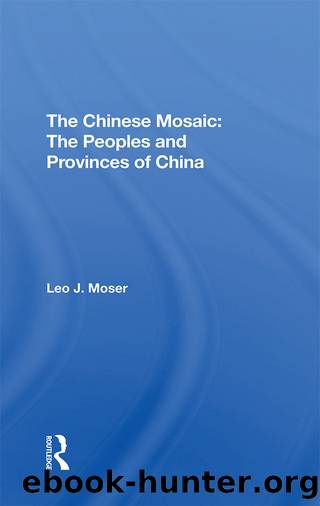The Chinese Mosaic: The Peoples and Provinces of China by Leo J Moser

Author:Leo J Moser [Moser, Leo J]
Language: eng
Format: epub
Tags: Social Science, Political Science, World, Asian, Regional Studies
ISBN: 9781000315424
Google: GCCeDwAAQBAJ
Goodreads: 49645981
Publisher: Routledge
Published: 2019-06-18T00:00:00+00:00
11
Shanghai and the Wu Peoples
The 85 million people who speak the various dialects of Wu live in the provincial-level municipality of Shanghai and in Zhejiang and Jiangsu provinces. Those in Jiangsu Province live primarily south of the Yangzi River (Chang Jiang). North of the mouth of the river there are a few enclaves of Wu speakers.
The Wu region differs from those of other Sinitic sublanguages in many ways. For one thing, it has several culture centers, whereas most of the other sublanguage groups have one local "capital," a population center that sets the cultural and linguistic pattern for the group. The Northern Mandarin-speaking peoples have Beijing; the Yue have Guangzhou (Canton); the Minnan of Fujian Province have Xiamen (Amoy); the Minbei have Fuzhou. Even the scattered Hakka can look to Meixian as their geographic, linguistic, and cultural center.
The Wu peoples are much too diverse for this. Shanghai, which one might expect to play such a role, does not really do so. It is a new city, to a great extent the creature of Western economic influences. Its population has been drawn from various Wu-speaking districts, as well as from Nanjing and beyond. Suzhou, Hangzhou, Shaoxing, and several other cities have played major roles in Wu history, and yet none is truly central to the entire region.
Shanghai was a town of only local economic importance before the British saw the potential of its location and had it included among the first five treaty ports to be opened to foreign trade in 1842. Much of the present-day city was subsequently built upon the mud and silt of the Yangzi delta. Workers and businessmen came to Shanghai not only from the nearby cities of Hangzhou, Suzhou, and Ningbo, but also from the Eastern Mandarin region and from commercial centers as far away as Shantou and Guangzhou.1
Contrary to the pattern in most of China, the Wu peoples usually do not describe their subethnic identities in terms of their province of origin. This is the result of several factors. Only the southern third of Jiangsu Province is Wu speaking; Zhejiang Province is diverse and not totally Wu speaking; and the Wu peoples of Zhejiang have long tended to identify themselves by their native prefecture rather than by province. Zhejiang prefectures early in this century were Huzhou, Jiaxing, Hangzhou, Yenzhou (heavily influenced by the Wannan district of Anhui Province), Quzhou (WG: Ch'ü-chou; heavily influenced by Jiangxi), Jinhua, Chuzhou (WG: Ch'uchou; somewhat influenced by Fujian), Wenzhou (parts of which speak Minnan), Taizhou, Shaoxing, and Ningbo.
Map 14. The prefectures of Zhejiang Province.
Download
This site does not store any files on its server. We only index and link to content provided by other sites. Please contact the content providers to delete copyright contents if any and email us, we'll remove relevant links or contents immediately.
| Anthropology | Archaeology |
| Philosophy | Politics & Government |
| Social Sciences | Sociology |
| Women's Studies |
The Secret History by Donna Tartt(19053)
The Social Justice Warrior Handbook by Lisa De Pasquale(12187)
Thirteen Reasons Why by Jay Asher(8893)
This Is How You Lose Her by Junot Diaz(6877)
Weapons of Math Destruction by Cathy O'Neil(6265)
Zero to One by Peter Thiel(5787)
Beartown by Fredrik Backman(5737)
The Myth of the Strong Leader by Archie Brown(5500)
The Fire Next Time by James Baldwin(5431)
How Democracies Die by Steven Levitsky & Daniel Ziblatt(5215)
Promise Me, Dad by Joe Biden(5141)
Stone's Rules by Roger Stone(5081)
A Higher Loyalty: Truth, Lies, and Leadership by James Comey(4954)
100 Deadly Skills by Clint Emerson(4921)
Rise and Kill First by Ronen Bergman(4780)
Secrecy World by Jake Bernstein(4741)
The David Icke Guide to the Global Conspiracy (and how to end it) by David Icke(4709)
The Farm by Tom Rob Smith(4502)
The Doomsday Machine by Daniel Ellsberg(4484)
